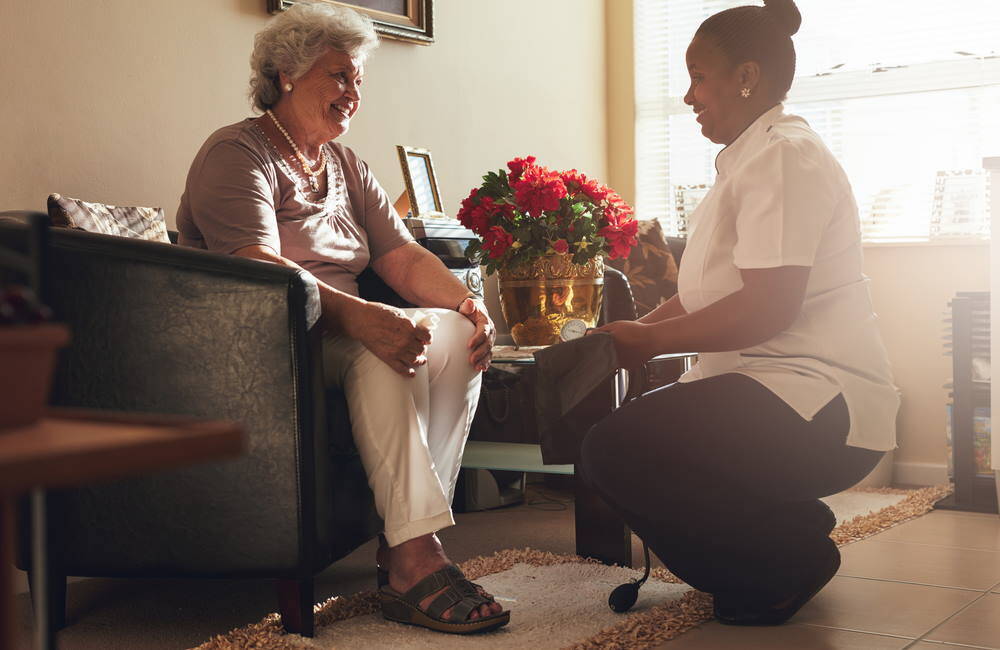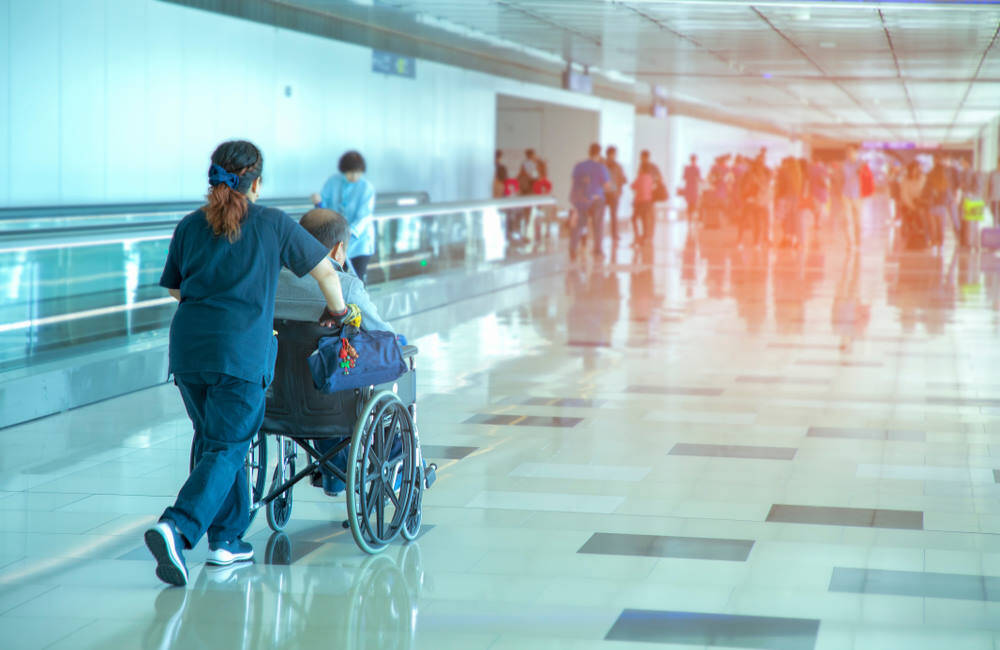
by Flying Angels Editorial Team | News & Resources
Flight nurses travel with patients in both emergency and non-emergency situations. They have specialized skills in providing medical care at high altitudes and managing a patient’s medications. In the case of non-emergency flight nurses, they help patients plan their trips, navigate through the airport and deliver any medical care needed during the flight.
While most people associate flight nurses with emergency situations they have seen on movies and television shows, in real life most people come in contact with non-emergency medical transport (NEMT) flight nurses. People hire NEMT flight nurses through companies who have experienced nurses on staff to accompany clients on their journey.
People who use non-emergency transport include those with chronic illness, injuries, and debilitating conditions. Older flyers also use NEMT for support in trip planning and getting through the airport.
Commercial Airline NEMT Explained
What Do Flight Nurses Do?
A day in the life of a flight nurse includes many different duties and responsibilities. Their work differs from that of emergency flight nurses who provide pre-hospital care to people who have suffered injuries due to an accident, natural disaster or other emergency.
A flight nurse’s work starts before the journey begins. NEMT flight nurses collaborate with flight coordinators, who are also nurses, to go over all the details of the patient’s flight. They go over airport procedures and also contact any airline or airport officials they need to speak with before the journey begins.
They also review the condition of the client, ensuring they are bringing all the medical equipment and medication required for the journey. They pack their own medical kit to prepare for any needs the client might experience during the trip.
Flight nurses are trained in flight physiology, as well as psychological distress patients may experience during a flight. They also track the times for giving clients their medication and make routine health checks.
After landing, NEMT flight nurses make sure the client disembarks from the plane safely and ensures they get to their ground transportation. In some cases, flight nurses may even travel with patients to their final destination.
Day in the Life of a Flight Nurse
What Is a Flight Nurse Agency?
NEMT companies employ flight nurses employ registered nurses with years of experience in emergency room nursing and with formal training in providing medical services during a flight. They work with commercial airlines, helping clear any obstacles patients might encounter during their trip. People in many different situations may want to travel with a flight nurse. They include those who:
- Recently suffered an injury and want assistance while flying
- Recently went through a medical procedure and require medical support during travel
- Those with a chronic condition or illness that makes it difficult to travel alone
- Families who want a nurse to travel with older family members when they relocate to a new home or travel for a family get-together
A flight nurse can provide important care for those who do not wish to travel alone and want the security of having a trained nurse as a flight companion. For those in such situations, a NEMT flight nurse provides the comfort of knowing they will get to their destination safely, with professional medical care throughout the journey.
Can I Hire a Nurse to Fly With Me?

by Flying Angels Editorial Team | News & Resources
A flight nurse agency provides flight nurses who travel with those who need assistance, providing them medical care and ensuring they reach their destination safely.

by Dan McCormick
Flight Nurse Patient Nurse AdvocacyJanuary 25, 2020 Patient advocacy has been around for many years. In the past, a patient advocate usually meant a member of the family, a good friend, or perhaps a clergyman or pastor. Family members, friends, and others can still...

by Flying Angels Editorial Team | News & Resources
Not every day is the same for flight nurses who work in non-emergency medical transportation (NEMT). Every day, they deal with different types of patients who need a variety of medical services during their flight.
However, there are certain duties that often come up every day for a NEMT flight nurse. But first, it’s important to understand what NEMT is and how it differs from an air ambulance.
What is an International Transport Nurse?
What Is NEMT?
NEMT involves the transportation of patients who require or desire medical assistance when traveling on scheduled flights on commercial airlines like Delta, United, Lufthansa, etc… both domestic and international. People hire a company like Flying Angels so a flight nurse can travel with their loved one. This can be for many reasons, including medical trips to specialist hospitals and doctors far away, for relocating an elderly parent, or for bringing home a loved one who was injured overseas. Family members are always welcome to fly with the flight nurse, but in most cases, it is just the flight nurse and the patient.
Whatever the case, flight nurses have a long list of duties. Flight nurses for Flying Angels all have experience in providing emergency medical care and have extensive experience in dealing with emergency and trauma situations.
What Does Flying Angels Do?
Duties For Flight
Nurses
So, what does a flight nurse do on a typical day? They usually include some or all the following.
Double Checking Plans
Flight nurses work with flight coordinators (who also are nurses) to handle the details in arranging NEMT with commercial airlines. They will review the procedures for the airports they plan to visit that day and reach out to any officials they need to speak with before arriving at the airport.
Packing The Medical
Kit
Prior to any transport flight coordinators prepare an extensive case file that will include relevant information on the patient, and all details related to the transport including ground, air, hotels, and points of contact. Flight nurses will review the case file of that day’s patient beforehand. They will know all the medical equipment they need to deal with any type of issue that might come up given the conditions of each patient. Before departing home, will make sure they have any specialty medical equipment needed for the flight such as specialty reclining wheelchairs, oxygen equipment, suction, nebulizers, etc…
Flying with Oxygen & Medications
Meeting Schedules
Working in tandem with the flight coordinators, flight nurses make sure they meet all the pre-planned points on the trip, as laid out in the case file. The day before the flight the flight nurse will meet with the client at their residence and facility and will go over the plan for the following day. The flight nurse will confirm that all documents are in order, all medications are accounted for, and that all parties involved are aware of the schedule for the following day. The flight nurse will also will confirm that the ground transportation, arranged earlier by the flight coordinator is set up and in order. The flight nurse will stay overnight at a nearby hotel. The day of transport the flight nurse will return to pick up the patient at their home or residence and travel with them to the airport.
How Does a Flight Coordinator Help?
During the Flight
Flight nurses with Flying Angels have trained in flight physiology, and have extensive experience in air travel and the complexities involved getting through the check-in process, security, and customs & immigration for international flights. They also understand any psychological distress a patient might feel throughout the journey. Further, they know the specific circumstances of the patient they are flying with that day and know the signs of any problem. They also will monitor when it is time for medications and make routine checks.
What is Aviation Physiology?
After Landing
Flights nurses oversee the patient disembarking from the plane safely and make sure they get through the airport to the awaiting ground transportation where they will travel with the patient to their final destination. Typically they will stay at an airport hotel and will then return to their point of origin the following day ready for another flight.
The daily routine of a flight nurse always has some variables, but it’s an exciting and challenging job no matter what the specific duties for each day’s flight. Flight nurses serve an important function in working with patients with medical conditions and illnesses, keeping them safe when they fly.
What are Concierge Nursing Services?

by Flying Angels Editorial Team | News & Resources
Patient advocacy has been around for many years. In the
past, a patient advocate usually meant a member of the family, a good friend or
perhaps a clergyman or pastor.
Family members, friends and others can still fulfill this
role. However, it long ago became a position held by people who, while not
medically trained themselves, were familiar with the operation of the
healthcare system.
The idea is to have a person who understands the ins and outs of the healthcare system to advocate on your behalf with doctors, nurses and other medical staff. Patient advocates are independent of the medical system but at the same time familiar with it. A person hires a patient advocate in much the same way they hire an accountant or attorney. This way the client knows that the advocate works solely for them and is not beholden to any other interests. While patient advocates are not covered by insurance, they can be an invaluable ally in the client’s corner.
What Does A Patient Advocate Do?
What Patient Advocates do is either navigational (making
appointments, following up on paperwork, making sure prescriptions are filled, and
such) – or money-related (auditing medical bills, negotiating with insurers or
hospitals). Advocates in those positions do offer a good example of the
fundamental services that an advocate provides for a patient.
For example, they closely monitor the patient’s well-being,
both physical and emotional, and give them an opportunity to discuss those
issues. A patient advocate acts as a liaison between the patient and medical
staff.
In general, patient advocates help cut through red tape and
get patients what they need. They act as a supporter, promoter and spokesperson.
It’s a key position to help people get better medical care, and it leads to
better patient outcomes.
Where to find a Patient Advocate?
Fortunately, there are many organizations that function as
advocates for patients. Flying Angels works directly within many of these
organizations.
They include the following.
• Academy of Special Needs Planners (ASNP)
• The National Guardianship Association (NGA)
• The Aging LifeCare Association (ALCA)
• The Alliance of Professional Health Advocates (APHA)
Flying Angels also is a proud sponsor and exhibitor at the International Conference on Patient Advocacy (ICOPA), which is being held this October in Chicago. The theme of this year’s conference is “a rising tide floats all boats.”
Flight Nurse Patient Advocacy
Unlike most medical situations, flight nurses and their
patients are on the move. They must plan out transportation to the airport,
through airport security and boarding the plane. They also have to ensure that
a patient is comfortable on the plane itself.
In addition to being a patient advocate while going through
the airport and onto the plane, flight nurses also must ensure that patients
have all their proper medications during the flight. They may keep track of
their wheelchair and other medical equipment and make sure it is stored safely
aboard the plane.
Flight nurses also help patients make informed decisions
during their trip. This can include everything from going through security to
finding the right seat on the plane that gives them the best access to the bathroom
or the exit from the plane.
Another part of patient advocacy is also explaining any medical terms or transport-related issues, such as how the TSA conducts security checks on wheelchairs.
Conclusion While Patient advocacy was originally left to families, designated friends and clergy, the complexity of the modern health care system can easily overwhelm a patient and the best of intentioned laypersons. Professional Patient advocacy started with nurses working in hospitals. They have long acted as a liaison between patients and other members of the medical staff. Modern Patient Advocates are highly skilled professionals who work directly for the patient and make sure they get the best care from the healthcare system possible.




